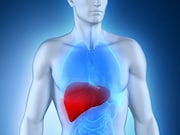Glecaprevir + pibrentasvir effective for those who previously failed direct-acting antiviral treatment
THURSDAY, Nov. 15, 2018 (HealthDay News) — Combined treatment with glecaprevir and pibrentasvir (G/P) is highly effective in treating chronic hepatitis C virus (HCV) genotype-1 infections that failed to respond to direct-acting antiviral therapy, according to a study presented at The Liver Meeting, the annual meeting of the American Association for the Study of Liver Diseases, held from Nov. 9 to 13 in San Francisco.
Mark S. Sulkowski, M.D., from Johns Hopkins Hospital in Baltimore, and colleagues evaluated the U.S. Food and Drug Administration-labeled G/P regimen in patients infected with HCV genotype 1 who previously failed the combination of an NS5A inhibitor with sofosbuvir. Patients who did not have cirrhosis were randomly assigned to receive G/P for either 12 (78 patients) or 16 weeks (49 patients), while patients with cirrhosis were randomly assigned to receive G/P with ribavirin for 12 weeks (21 patients) or G/P alone for 16 weeks (29 patients).
As of October 2018, sustained virologic outcomes data were available for 172 of the 177 study participants. The researchers found that of the 172 patients, 157 achieved sustained virologic response. Among 126 patients without cirrhosis (data on one patient are still pending), 91 percent achieved sustained virologic response. Within this group, there was a 90 percent sustained virologic response rate in the 78 patients who received G/P for 12 weeks and a 94 percent response rate in the 48 patients who received G/P for 16 weeks. Among the 46 patients with cirrhosis (data on four patients are still pending), 91 percent achieved sustained virologic response. Ninety-six percent of patients in this group who were randomly assigned to 16 weeks of G/P achieved sustained virologic response. There was no treatment discontinuation due to adverse events (AEs), and the most frequently reported AEs were fatigue (17 percent), headache (19 percent), and nausea (9 percent). There were 11 serious AEs in nine participants, including one resulting in death (hepatocellular carcinoma), although none were classified as related to treatment.
“Patients who failed direct acting antiviral HCV therapy represent a challenging population with few retreatment options,” the authors write.
Copyright © 2018 HealthDay. All rights reserved.








